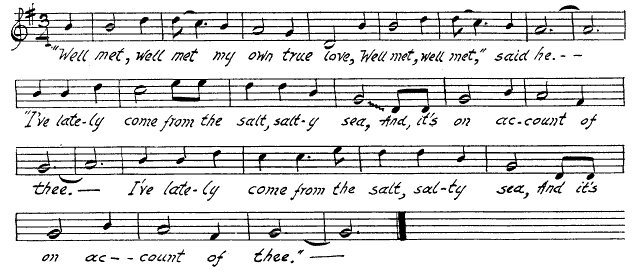The House Carpenter- Sorrels (UT) 1947 Hand
[From: Two Child Ballads in the West by Wayland D. Hand; Western Folklore, Vol. 18, No. 1 (Jan., 1959), pp. 42-45. His notes follow,
R. Matteson 2013]
THE HOUSE CARPENTER
This excellent number was collected from Mrs. Rosalie Sorrels, of Salt Lake City, July 20, 1957. Mrs. Sorrels, folk song enthusiast, and collector in her own right, learned the text in about 1947 from an old family ballad notebook which was later lost in a flood. This book had been kept by her maternal grandmother, Mrs. Rosalie Cope Stringfellow, who lived near Idaho City, Idaho, about thirty miles northeast of Boise. There is reason to believe that Mrs. Stringfellow had known the ballad as a younger woman in the Province of Manitoba. The melody came from Mrs. Sorrels' uncle, Stan Stringfellow, whom-in the absence of more precise genealogical information- Mrs. Sorrels identifies more readily with her grandfather's native state of Virginia than with her grandmother's Canadian ancestry.

1. "Well met, well met my own true love,
Well met, well met," said he.
"I've lately come from the salt, salty sea,
And it's all on account of thee.
I've lately come from the salt, salty sea,
And it's all on account of thee."
2. "I've lately come from the salt, salty sea,
And it's all on account of thee.
I've had an offer of a king's daughter fair,
And she fain would have married me.
Oh, I've had an offer of the king's daughter fair,
And she fain would have married me."
3. "If you've had an offer from a king's daughter fair,
I think you're much to blame,
For I've lately married a house carpenter,
And I think he's a nice young man.
Oh, I've lately married a house carpenter,
And I think he's a nice young man."
4. "Oh, will you leave your house carpenter,
And follee (follow?) along with me?
I'll give you jewels and fine silken gowns,
And I'll live but for thee.
Oh, I'll give you jewels and fine silken gowns,
And I'll live but for thee."
5. "Oh keep your jewels and fine silken gowns,
And keep your fine silken hose.
Rest assured, I'm not so poor,
As to have to marry for clothes.
Rest assured, I'm not so poor,
As to have to marry for clothes."
6. They hadn't been sailing about three weeks,
I'm sure it was not four;
Before the gallant ship turned 'round three times,
And sank to rise no more.
Before the gallant ship turned 'round three times,
And sank to rise no more.
7. "Oh, cursed be the sailor's life,
And all the other strife.
For the robbing of the house carpenter,
And the taking away of my life.
For the robbing of the house carpenter,
And the taking away of my life."
The version is typical, of course, except in the matter of the returning lover's inducement of the carpenter's wife to run away with him (Stanza 4). In a search of the main American collections I nowhere find reference to a bribe of "jewels and fine silken gowns," but this may be an intrusion from some other ballad. Blandishments are usually in terms of "gold and store," but even more often in terms of men and ships at sea to be at the wife's command.